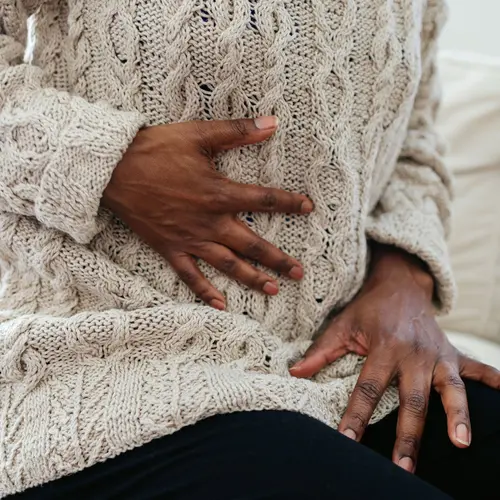SPEAKER: It can fight cancer,
withstand open-heart surgery,
and battle the common cold.
It destroys bacteria, fungus,
and parasites on a daily basis.
Working like an army of National
Guardsmen
to fight off infection,
your immune system is the body's
best defense against sickness.
But this isn't the case
for people
with ulcerative colitis.
If you have UC,
your immune system overacts when
it comes to your intestine.
This causes too much
inflammation and a host
of other complications.
Internal complications can vary
from ulcers, sores, and pockets
of pus in the colon to diarrhea
to bleeding.
You may feel physically tired,
lose your appetite and pounds
when it comes to the scale.
Severe dehydration is also
a complication that can lead
to kidney stones.
Long-term complications
for those with UC
include anemia, an increased
risk of colon cancer, bone loss,
and in rare cases,
liver disease.
[MUSIC PLAYING]
You might worry about when your ulcerative colitis (UC) symptoms will strike. But the right medication and avoiding certain foods can ease or ward off flares.
Your doctor can help you find the best way to manage your disease. Here are some things they might suggest.
Take Your Meds
Your immune system is your body’s defense against germs. But it goes into overdrive when you have UC. That leads to too much inflammation. Drugs can help slow this process.
You’ll need to take them exactly the way your doctor tells you to. You could have a flare if you skip a dose -- even if you don’t have symptoms right now.
You might take one or more of these medications:
- Aminosalicylates (5-ASA)
- Biologics
- Corticosteroids
- Immunosuppressants
Newer medications being studied include a group called sphingosine 1-phosphate receptor modulators. These can be taken by mouth. Researchers think they may get around the antibodies that sometimes form with medications given as a shot. Antibodies are proteins that help destroy viruses, bacteria, and other things your body doesn’t recognize.
Scientists are also researching:
- IL-23 blockers
- Integrin blockers
- TYK2 blocker and JAK inhibitors
Avoid Triggers
There are other things that might cause or worsen your symptoms besides skipping meds.
Nonsteroidal anti-inflammatory drugs (NSAIDs). These are nonprescription medications such as aspirin, ibuprofen, or naproxen. Acetaminophen is a safer choice for mild pain or fever.
Antibiotics. These drugs fight infections. But they also change your gut bacteria. Tell your doctor if you have a flare while you’re on one.
Stress. It can affect your digestive tract and worsen inflammation. Ask your doctor for tips on how to manage.
Food. Certain foods don’t cause UC. But what you eat or drink can trigger symptoms. A food diary might help you pinpoint what makes you feel bad.
Know What to Watch For
You know your body best. But talk to your doctor about what a flare might look like for you. If you have mild symptoms, it might be OK to watch and wait for a day or so.
Signs to look for include:
- Blood in your stool
- Frequent diarrhea
- Urgent need to empty your bowel
- Belly cramps
- A feeling that you can’t empty your bowel
- Mouth sores
- Rashes or other skin problems
- Joint pain
Ask your doctor which symptoms signal an emergency. Let them know right away if you have:
- High fever
- Pain that doesn’t go away
- Constant diarrhea or throwing up
- Lots of blood in your stool
Don’t Self-Medicate
You might have old drugs, like steroids, from a prior flare. But you shouldn’t treat yourself without talking to your doctor first. They can run some tests to find out what’s causing your symptoms this time. You might need to treat an infection or switch to a different medicine.
Keep Eating
It’s important to get enough nutrition. But that can be hard to do during a flare. You might lose your appetite or get symptoms like belly pain, bloating, or diarrhea when you eat.
You may feel better if you dine on small meals more often or avoid certain foods. Here are some common foods that cause trouble for people with UC:
- Crunchy vegetables, such as broccoli or cauliflower
- Nuts and whole grains
- Lactose, the sugar found in dairy foods
- Artificial sweeteners
- Sugary foods and drinks
- High-fat and fried foods
- Alcohol
- Caffeine
- Spicy foods
Sometimes it’s really tough to figure out trigger foods on your own. It’s OK to ask your doctor to set you up with a dietitian. Make sure you meet with someone who works with people who have UC.
Ask About Surgery
You can get a procedure that takes out your large intestine, which includes your colon and rectum. This eases your symptoms by getting rid of the inflammation that causes your flares.
Your doctor might suggest surgery if:
- Drugs don’t control your symptoms
- You have serious side effects from medicine
- You have precancerous cells in your colon
- Your symptoms are life-threatening
- Only corticosteroids help
- You have colon cancer
Talk to your doctor about the pros and cons of surgery. Questions to get you started include:
- Will surgery be laparoscopic or open?
- Will it change how I empty my bowel?
- Will I use a temporary or permanent ostomy pouch?
- Will I need more than one surgery?


